|
|
|
Sort Order |
|
|
|
Items / Page
|
|
|
|
|
|
|
| Srl | Item |
| 1 |
ID:
118376
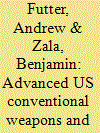

|
|
|
|
|
| Publication |
2013.
|
| Summary/Abstract |
The Obama administration has made a great effort to increase the role of advanced conventional weaponry in US national security thinking and practice, in part to help reinvigorate the global nuclear disarmament agenda by reducing the role played by nuclear weapons in the US defense posture. However, such a strategy is fundamentally flawed because increases in US conventional superiority will exacerbate US relative strength vis-à-vis other powers, and therefore make the prospect of a nuclear weapon-free world seem less attractive to Washington's current and potential nuclear rivals. Consequently, it is highly likely that the impact of efforts to increase US advanced conventional superiority through ballistic missile defense and a conventional "prompt global strike" program will ensure that the Obama administration is adopting a pathway to nuclear abolition on which it is the sole traveler for the foreseeable future.
|
|
|
|
|
|
|
|
|
|
|
|
|
|
|
|
| 2 |
ID:
191501
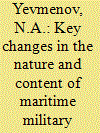

|
|
|
|
|
| Summary/Abstract |
This paper, based on an assessment of the military strategic situation and the identified scale of maritime military threats to Russia, identifies the main changes in their nature and content. It also emphasizes that Russia needs a powerful, balanced Navy capable of effectively countering these threats from any part of the World Ocean.
|
|
|
|
|
|
|
|
|
|
|
|
|
|
|
|
| 3 |
ID:
191488
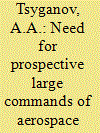

|
|
|
|
|
| Summary/Abstract |
This paper attempts to justify the need to radically reorganize the structure of Russia's Aerospace Forces (ASF) by establishing large commands that would be directly subordinate to the ASF commander-in-chief and tasked solely with repulsing strikes from an adversary's aerospace attack weapons during a "prompt global strike."
|
|
|
|
|
|
|
|
|
|
|
|
|
|
|
|
| 4 |
ID:
114490
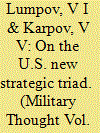

|
|
|
|
|
| Publication |
2012.
|
| Summary/Abstract |
On the basis of their study and overview of foreign sources published between 2001 and 2010, the authors describe the results of their efforts and give their views on the substance, nature, and orientation of the U.S. military strategy concept of prospective transformation of the U.S. nuclear triad.
|
|
|
|
|
|
|
|
|
|
|
|
|
|
|
|
| 5 |
ID:
143301
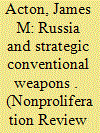

|
|
|
|
|
| Summary/Abstract |
Russian political leaders and military strategists are growing increasingly concerned about “strategic conventional weapons”—a broad category that appears to include all non-nuclear, high-precision, standoff weapons—and about long-range, hypersonic weapons, in particular. These concerns are complex and multifaceted (and, in some cases, contradictory), but chief among them are the beliefs that strategic conventional weapons could prove decisive in a major conflict and that Russia is lagging behind in their development. US programs to develop and acquire such weapons—namely, the Conventional Prompt Global Strike program—are of great concern to Russian strategists, who argue both that the United States seeks such weapons for potential use against Russia—its nuclear forces, in particular—and because strategic conventional weapons are more “usable” than nuclear weapons. Asymmetric responses by Russia include increased reliance on tactical nuclear weapons, efforts to enhance the survivability of its nuclear forces, and investments in air and missile defenses. There is also strong—but not completely conclusive evidence—that Russia is responding symmetrically by attempting to develop a long-range, conventionally armed boost-glide weapon.
|
|
|
|
|
|
|
|
|
|
|
|
|
|
|
|
| 6 |
ID:
138185
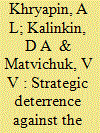

|
|
|
|
|
| Summary/Abstract |
The authors examine the basic principles underlying the design of a strategic deterrent to counter a potential adversary's aggression against the Russian Federation, considering the development of a global ABM defense system and prompt global strike capabilities in the U.S.
|
|
|
|
|
|
|
|
|
|
|
|
|
|
|
|
| 7 |
ID:
143300
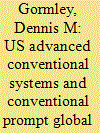

|
|
|
|
|
| Summary/Abstract |
The dangers and risks of employing a Conventional Prompt Global Strike (CPGS) capability greatly exceed the benefits. More suitable, if less prompt, alternatives exist to deal with fleeting targets. Even a niche CPGS capability—consisting of approximately twenty systems—carries risks, to say nothing of proposals to develop hundreds or more. Most dangerously, CPGS could stir the pre-emption pot, particularly vis-à-vis states that correctly perceive to be within the gunsights of US CPGS weapons; other states, too, may feel emboldened to emulate this US precedent and undertake their own form of prompt, long-range strike capability. Compressed circumstances surrounding such a scenario could foster unwanted erratic behavior, including the misperception that the threatening missile carries a nuclear weapon. But the true Achilles's heel of the CPGS concept is the unprecedented demands it places on the intelligence community to provide decision makers with “exquisite” intelligence within an hour timeframe. Such compressed conditions leave decision makers with virtually no time to appraise the direct—and potentially unintended—consequences of their actions.
|
|
|
|
|
|
|
|
|
|
|
|
|
|
|
|
|
|
|
|
|